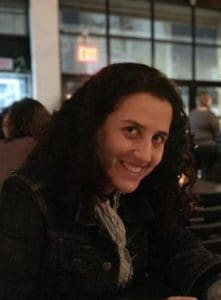Environmental Sociology and Justice. Member Spotlight: Dr. Sarah Michelle Alexander
Dr. Sarah Michelle Alexander is an environmental sociologist who explores the social side of the relationships people have with the natural world. She is passionate about environmental justice and organizing for change, and is a board member of Water Watchers, which works to protect waterways in Ontario, Canada. She is currently a visiting fellow at Cornell University in the Department of Global Development, where she works on a project that explores the social landscape of flood risk.
Early Activism and Education
 Sarah has long been interested in activism. As a university student at Wells College, she became involved with Oxfam America’s Change Initiative Program, which selects university students from across the United States to complete training in Oxfam’s programming areas, including trade justice and hunger and poverty. Through her experience in this program, she also became involved with United Students for Fair Trade, serving as a national organizer.
Sarah has long been interested in activism. As a university student at Wells College, she became involved with Oxfam America’s Change Initiative Program, which selects university students from across the United States to complete training in Oxfam’s programming areas, including trade justice and hunger and poverty. Through her experience in this program, she also became involved with United Students for Fair Trade, serving as a national organizer.
The Social Environment
When it came time for Sarah to transition out of her life as an undergraduate student, she looked to adults in her life that were doing the kind of work she wanted to do: work that included broad thinking, building bridges, and trying to make sense of the world. In doing this, she decided to pursue graduate studies, obtaining her teaching credentials from the University of Toronto and her Ph.D. in development sociology from Cornell University, where her dissertation explored New York City residents and their behavior in relation to drinking water. She explored the role that trust and other social factors play in shaping people’s in-home drinking water behavior, finding profound connections between social forces and individual’s environmental choices. Sarah has continued exploring these relationships in her current work as an environmental sociologist, in which she explores the relationships different people have with the natural environment, including what aspects of it they have or do not have access to or awareness of. “Environmental sociology allows us to see the big ways that the social world impacts how we interact with the natural world.”
Environmental Justice
Sarah is also very passionate about environmental justice, as it allows her to integrate her academic and activist backgrounds. She recently joined the board of an Ontario-based organization called Water Watchers, which works to protect waterways in Ontario. Her work in the non-profit sector also led her to MBBI, as she is interested in applying her skills as an educator to conflict resolution. She knows that emotions and tradition are huge drivers of human behavior, but she is also aware that simply knowing this is not enough to create change, and she wants to be part of “doing rather than simply observing.” Sarah is currently a visiting fellow at Cornell University’s department of global development, where she is involved in a project that looks at the social landscape of flood risk in different communities in New York State, and trying to understand the social dynamics that surround flood risk. This work is especially important as the climate continues to change, because “it’s affecting people in different ways. It’s very problematic that if you are economically disadvantaged and socially disadvantaged that you are more likely to live in an area with more environmental risks.”
Empathy in Mediation
Though Sarah does not have much formal experience in mediation, she is certainly aware of some of the challenges mediators face in trying to resolve conflicts. She explains that mediation is not completely intuitive, as it requires a great deal of empathy and sensitivity, while also requiring mediators to temper the influence of their emotions on their approach to a conflict. This is especially important in mediation, as those in need of mediating services will also be highly driven by their emotions, and will most likely be in an emotional state. Empathy, though, remains vitally important. As Sarah explains, “we don’t resolve conflicts with facts. We don’t say ‘you’re right because of this and you’re wrong because of this.’ We need to understand how people are actually interacting.” This creates challenges for mediators and makes the job extremely difficult. Because of this, Sarah says, mediators should not put pressure on themselves to achieve perfection with every project.
It is important for mediators to see a victory in simply changing the dynamic of a conversation, or in getting people to see something from one another’s perspectives. Sarah is also hopeful that the rise in technology-based discussions as a result of COVID-19 will assist in building bridges across the world, as they make long-distance conversations easier. “As we scramble to make changes to adapt to crises. We sometimes come out of those crises stronger in ways that we didn’t plan for.” Though the pandemic has created issues and challenges worldwide, it has also yielded tools that can facilitate peacebuilding.
Article by Tess Hargarten, MBBI Writer
